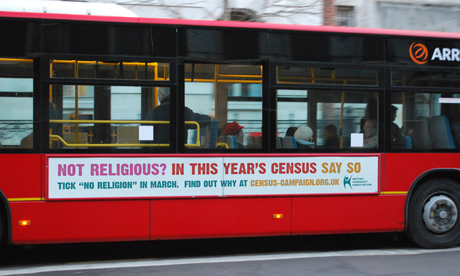Hackney census: a question of religion

Bus adverts bear the slogan ‘Not religious? In this year’s census say so!’
The question ‘What is your religion?’ was introduced for the first time to the 2001 population census; 400,000 people in the UK answered ‘Jedi’. Yet if some respond to this question in a light-hearted way, the census has also troubled some groups in Hackney. Prominent voices in the Jewish and secular communities in particular have raised concerns about the count of residents due to take place on 27 March.
Every ten years, British inhabitants are asked to provide personal information to the government in order to plan and fund public services such as schools, social housing, transport and healthcare. Participation in the census itself is mandatory for all residents, but answering the question on religion is not.
Hackney had a population of 202,000 at the time of the last census, which revealed great religious diversity in the borough, including the largest Charedi Orthodox Jewish community in Europe, estimated to number between 15,000 and 20,000.
But in the 2001 census, only 11,000 Hackney inhabitants described themselves as Jewish, which suggests that the census missed up to half of Hackney’s Jewish population.
The reasons for this are not entirely clear, but part of the explanation could be that Charedi Jewish families tend to be large, and households with seven or more members are obliged to request an additional form or to complete the census online if they are to list all their members.
The Interlink foundation and the Board of Deputies of British Jews have both urged members of the Jewish community to fill in the census and to answer the religion question.
According to Interlink, Hackney has lost £60 million per year in budget over the past ten years because of the borough’s poor compliance rate (the second worse of the country).
Daniel Hulkan of the Interlink Foundation (for Orthodox Jewish Voluntary Action) said he does not have any evidence to suggest that the number of non-returned forms in the Jewish community is higher than in the population as a whole, but said that the number of Jewish people who did not answer the religion question might be.
Mr Hulkan said: “Due to the persecutions experienced by Jews in continental Europe during the Second World War, it is natural that some people would be concerned about the data falling into the hands of people who might wish to use it for inappropriate purposes.
“In some cases, this might have led to people not completing the census at all. However, it is more likely that people for whom this was a concern would have simply chosen not to answer the religion question.
“Reassurance has been provided regarding the security of the data; several prominent rabbis have issued statements endorsing participation in the census; and surgeries are being set up to assist members of the community in completing the census, including the provision of additional forms for large families.”
Councillor Abraham Jacobson of Cazenove ward said: “The community has been actively encouraged to fill in the census by the rabbis and is very much expected to fill in the census this year,” adding that he regretted the fact that the census form allows for only six people in a household.
Other groups are not so keen on the census, and in particular the question on religion, which some secularists regard as a leading question.
The British Humanist Association (BHA) is running a campaign ‘If you’re not religious, for God’s sake say so’, which encourages atheists and agnostics to tick the ‘no religion’ box when filling the census.
BHA Chief Executive Andrew Copson said:”We are asking people to be honest and if they are not religious, to say so. Ticking “No religion” means that their voices will be heard and we will have a more truthful picture of what people really believe today.”
The secularist group says the formulation of the religious question (‘What is your religion?’) is ‘flawed’ and drives many people to a tick a ‘reflex’ answer, stating what religion they were brought up in rather than their current beliefs.
They are campaigning for a reformulation of the question, and disagree with the way government uses the religious data collected by the census. The BHA argues that the tax-payer should not be forced to fund religious facilities and schools when 51 per cent of the UK population claim to be ‘non-religious’ (according to The British Social Attitudes Survey published in 2011).
The Office for National Statistics has argued that the religious question is necessary to enhance local governments’ understanding of their populations’ needs for community services such as faith schools or the protection of communal buildings. The data collected on religion can also help authorities evaluate discrimination risks and it provides a better understanding of the local demographics.
In the 2001 census, 39,000 Hackney residents declared they did not have any religion.
Related: Taking part in census is essential for Hackney’s funding, says Mayor
